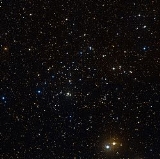
NGC 752
Encyclopedia
NGC 752 is an open cluster
in the constellation Andromeda
. The cluster was discovered by Caroline Herschel
in 1783 and cataloged by her brother William Herschel
in 1786, although an object that may have been NGC 752 was described by Giovanni Batista Hodierna before 1654.
The large cluster lies 1,300 light-year
s away from the Earth
and is easily seen through binoculars, although it may approach naked eye
visibility under good observing conditions. A telescope reveals about 60 stars no brighter than 9th magnitude within NGC 752.
Open cluster
An open cluster is a group of up to a few thousand stars that were formed from the same giant molecular cloud and have roughly the same age. More than 1,100 open clusters have been discovered within the Milky Way Galaxy, and many more are thought to exist...
in the constellation Andromeda
Andromeda (constellation)
Andromeda is a constellation in the northern sky. It is named after Andromeda, the princess in the Greek legend of Perseus who was chained to a rock to be eaten by the sea monster Cetus...
. The cluster was discovered by Caroline Herschel
Caroline Herschel
Caroline Lucretia Herschel was a German-British astronomer, the sister of astronomer Sir Friedrich Wilhelm Herschel with whom she worked throughout both of their careers. Her most significant contribution to astronomy was the discovery of several comets and in particular the periodic comet...
in 1783 and cataloged by her brother William Herschel
William Herschel
Sir Frederick William Herschel, KH, FRS, German: Friedrich Wilhelm Herschel was a German-born British astronomer, technical expert, and composer. Born in Hanover, Wilhelm first followed his father into the Military Band of Hanover, but emigrated to Britain at age 19...
in 1786, although an object that may have been NGC 752 was described by Giovanni Batista Hodierna before 1654.
The large cluster lies 1,300 light-year
Light-year
A light-year, also light year or lightyear is a unit of length, equal to just under 10 trillion kilometres...
s away from the Earth
Earth
Earth is the third planet from the Sun, and the densest and fifth-largest of the eight planets in the Solar System. It is also the largest of the Solar System's four terrestrial planets...
and is easily seen through binoculars, although it may approach naked eye
Naked eye
The naked eye is a figure of speech referring to human visual perception unaided by a magnifying or light-collecting optical device, such as a telescope or microscope. Vision corrected to normal acuity using corrective lenses is considered "naked"...
visibility under good observing conditions. A telescope reveals about 60 stars no brighter than 9th magnitude within NGC 752.
Components
| NAME | Right ascension Right ascension Right ascension is the astronomical term for one of the two coordinates of a point on the celestial sphere when using the equatorial coordinate system. The other coordinate is the declination.-Explanation:... |
Declination Declination In astronomy, declination is one of the two coordinates of the equatorial coordinate system, the other being either right ascension or hour angle. Declination in astronomy is comparable to geographic latitude, but projected onto the celestial sphere. Declination is measured in degrees north and... |
Apparent magnitude Apparent magnitude The apparent magnitude of a celestial body is a measure of its brightness as seen by an observer on Earth, adjusted to the value it would have in the absence of the atmosphere... (V) |
Spectral type | Database references |
|---|---|---|---|---|---|
| NGC 752 1 (HD 11624 HD 11624 |- style="background-color: #A0B0FF;" colspan="3"| Cluster Open|- bgcolor="#FFFAFA"| NGC 752 || HD 11624 or a star in cluster NGC 752.-References:*... ) |
01h 54m 57.6607s | +37° 07' 41.845 | 6.281 | K0 | Simbad |
| NGC 752 2 (BD+36 345) | Simbad |
External links
- SEDS – NGC 752
- perseus.gr – NGC 752 in a hires LRGB CCD image

